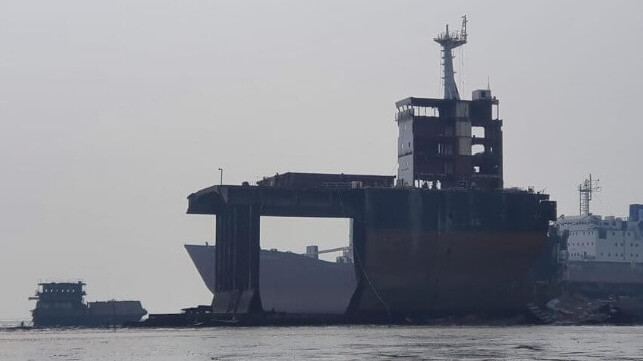Two Dead, Six Injured in First Quarter at S. Asian Shipbreaking Yards

Shipbreaking remains dirty and dangerous work, particularly in South Asia, the NGO Shipbreaking Platform reminded the industry in its latest update. While South Asian beaching yards pay far more per tonne for end-of-life tonnage, they have a certain ESH reputation from years of fatalities and injuries, which continued in recent months.
In Pakistan, two workers were killed when an iron plate fell onto them at Dewan Shipbreaking, one of the many plots in Gadani. The local union reports that the workers were dismantling the bulker Catherine Bright when they were crushed, and claims that they were forced to work without proper safety measures in place. The union claims that the workers' bodies were quietly buried at night, without any post-mortem, in order to reduce liability exposure for the yard owner and labor contractor.
"Pakistani authorities have failed to impose necessary measures to safeguard sustainable ship recycling practices. The killing of Qasim and Mustafa adds to a growing number of deaths that could have been avoided in Gadani, where fifteen vessels have been beached in the past year," said NGO Shipbreaking Platform in a statement.
The quarter also saw at least six significant injuries, all in Bangladesh. Two security guards were injured in a fall in the engine room of Chinese-owned Hao 3. A worker in the Hong Kong Convention-compliant yard SN Corporation broke a leg aboard the Japanese-owned Sight, sold via a cash buyer. A torch operator injured his back in a fall aboard Chinese-owned Jin Hai Xi, and another two workers were hurt while dismantling the Malaysian-owned tanker Nautica.
NGO Shipbreaking Platform has tallied a total of 449 deaths and 408 injuries at South Asian yards since 2009, or one casualty for every 10 ships broken. The NGO believes that injuries are widely underreported, and that the true count is likely higher.
To deal with the aftermath of these accidents, the NGO sets up periodic healthcare and training events for injured workers, hoping to rehabilitate them for other trades where their disabilities will not prevent them from earning a living. The group is collecting donations for this mission, and the costs are relatively low at about $400 for a six-month vocational training for one worker.
No comments:
Post a Comment